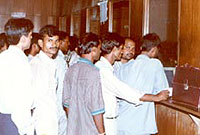|
July 2004
Uday
Chatterjee takes a look at Budget 2004-05 and what it
holds in store for the salaried Joe
 Contrary
to popular perception, the salaried class hates to pay
taxes. After all, they to are humans. This class is however
forced to pay tax as it is deducted at source from their
income. This class is the only one in the entire tax paying
fraternity that is fully tax compliant and it is for this
reason alone that they deserve a break. Contrary
to popular perception, the salaried class hates to pay
taxes. After all, they to are humans. This class is however
forced to pay tax as it is deducted at source from their
income. This class is the only one in the entire tax paying
fraternity that is fully tax compliant and it is for this
reason alone that they deserve a break.
They
got a welcome break today when finance minister P Chidambaram
in his budget speech announced that the tax exemption
limit is being raised from Rs 50,000 to Rs 1 lakh. Further,
there has been no change in the tax rates except a 2-per
cent education cess, which will be charged to all taxpayers.
The
measure will give relief to 1.4 crore assessees who will
now be out of the tax net. The minister expressed his
inability to give more relief or relief across the board,
in the current budget, but he promised to revisit the
subject if the compliance improves.
The
hike in the exemption limit is in line with the Kelkar
Committee''s recommendations on tax reforms. A point to
note is that the Kelkar Committee had recommended that
the exemption limit be raised from Rs 50,000 to Rs 1 lakh
and at the same time withdraw all incentives like standard
deduction, incentives on housing loans etc. Chidambaram
has not withdrawn the incentives and that should bring
more cheer to the salaried class.
The
salaried class comprises of the low, middle and high-income
groups. Among these, the low and the middle income group
suffer from a lack of clarity. A large majority in these
groups are simply unaware or just do not understand the
benefits that accrue from the incentives.
For
example, which sane person can understand a provision
which is worded as: "Under section 80D on account
of payment of medical insurance premia made by the employee
as explained on page 211 [Vide circular No 13, dt 23-12-2002.
Refer 259 ITR (St.) 9-31]?"
Apart
from section 80D, there are sections 80CCC, 80DD, 80DDB,
80E, 80G, 80 GG and 88C which are cached in equally vague
language which offer incentives to the salaried taxpayer.
Thus it is only taxpayers from the high income group who
can avail the benefits of incentives by hiring an accountant
for deciphering the tax sections and number crunching.
 A
former chairman of the central board of direct taxes (CBDT)
remarked on a recent television show that although the
tax exemption limit was Rs 5,000, with astute investments
in incentives a salaried person could avoid paying tax
up to a limit of Rs 1,20,000. Being a former chairman
of CBDT, he should know. And by that count, today, the
salaried taxpayer should be able to avoid paying taxes
up to a limit of Rs 1,70,000. A
former chairman of the central board of direct taxes (CBDT)
remarked on a recent television show that although the
tax exemption limit was Rs 5,000, with astute investments
in incentives a salaried person could avoid paying tax
up to a limit of Rs 1,20,000. Being a former chairman
of CBDT, he should know. And by that count, today, the
salaried taxpayer should be able to avoid paying taxes
up to a limit of Rs 1,70,000.
The
tax proposals specify that a person having an income exceeding
Rs 8.50 lakh would be required to pay a 10 per cent surcharge
on the total income tax payable after the rebate, and
also the education cess.
For
example, an individual with a taxable income of Rs 1 lakh
(after standard deductions at the old rate) will not be
required to pay any income tax, while a person having
a taxable income of Rs1.50 lakh will now have to pay an
income tax of Rs 19,380 (including the education cess).
An individual having a taxable income of Rs 8.50 lakh
will have to pay an income tax of Rs 2,33,580 (Rs 4,580
more than what he paid last year).
Family
pensions received by widows, children and nominated heirs
of members of the armed forces and the paramilitary forces
killed in action will be exempted from income tax.
The
benefit of Section 80DD and Section 80U is being extended
to people suffering from autism, cerebral palsy and multiple
disabilities.
|